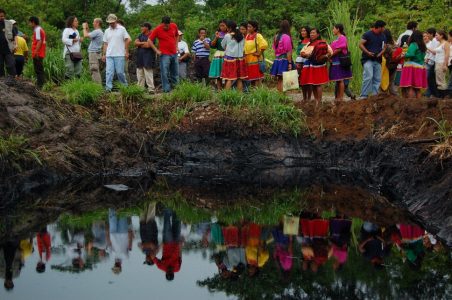Several organizations and networks are endorsing an open letter to Lenín Moreno Garcés [1], President of Ecuador, that will be delivered on May 21 to Ecuadorian embassies around the world.
They are asking for justice and are deeply concerned about the Chevron-Texaco case in the Ecuadorian Amazon region: “The case is irrefutable proof of the way the system whose purpose is to ensure the impunity of transnational companies all over the world works. After 25 years of trials, and although a judgement requiring Chevron (formerly known as Texaco) to pay US$9,500 million to repair environmental damage, has been ratified at every level of the Ecuadorian judicial system, it has never been enforced. To avoid complying with it, Chevron withdrew all of its assets from Ecuador. Because they did that, the men and women affected by the environmental disaster had to have recourse in foreign courts (in Argentina, Brazil and Canada) to have the judgement recognised and enforced, but so far, they have had no success.”
The Global Campaign to Reclaim Peoples´ Sovereignty, Dismantle Corporate Power and End Impunity [2] (a global network of over 200 organizations, movements, trade unions and communities affected by transnational corporations worldwide) signs that letter and also regrets the decision of the Supreme Court of Canada of April 4th of dismissing the appeal in this historic case of the Indigenous people of Ecuador versus Chevron.
The Global Campaign demanded, once again, the establishment of a UN Binding Treaty [3] on transnational corporations and human rights.
To analyze the Supreme Court´s decision, Real World Radio interviewed Beatrice Olivestri from Friends of the Earth Canada. She shared her views and made reference to the next steps necessary to achieve justice for the Ecuadorian people who suffered the “Amazonian Chernobyl”, as it is known due to its devastating impacts on the region.
“Canada has been missing an action at the global level and dealing, for example, with the negotiations for a treaty on transnational corporations. I still think there could and should be future cases where the Supreme Court could play a role in dealing with this question of the corporate veil, and the secrecy provided to corporations”.
